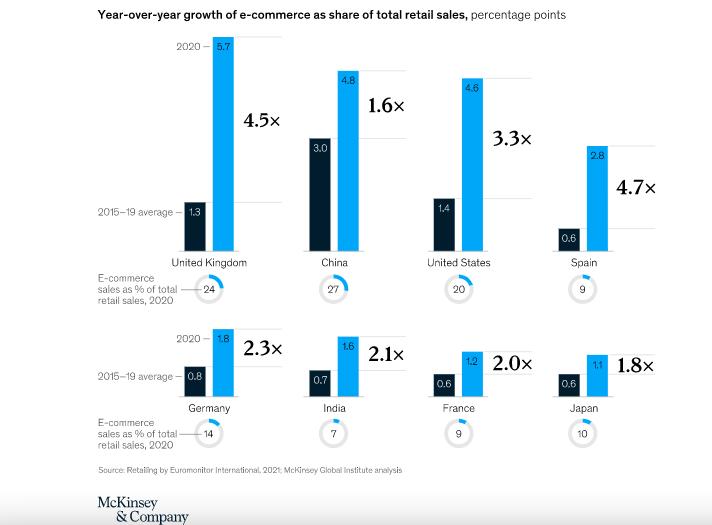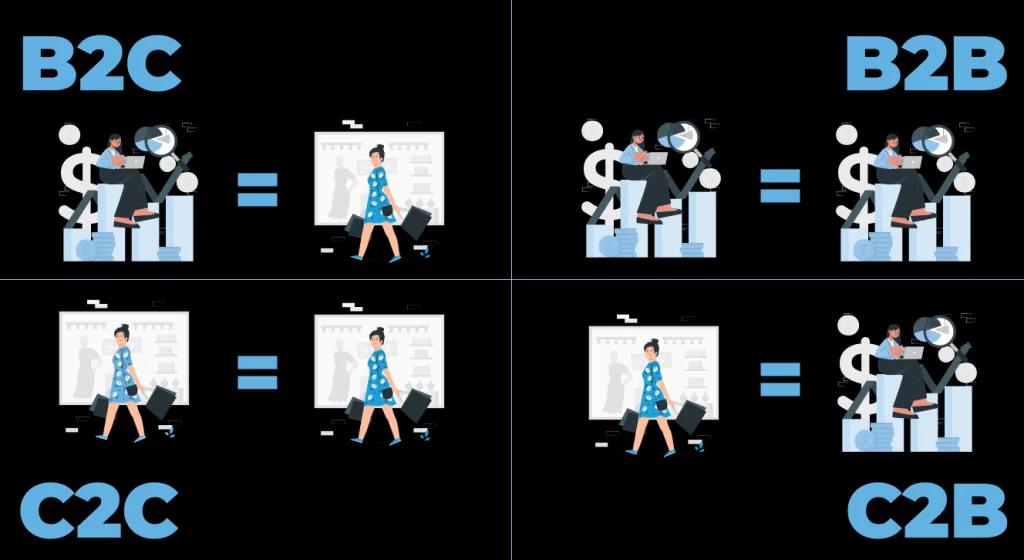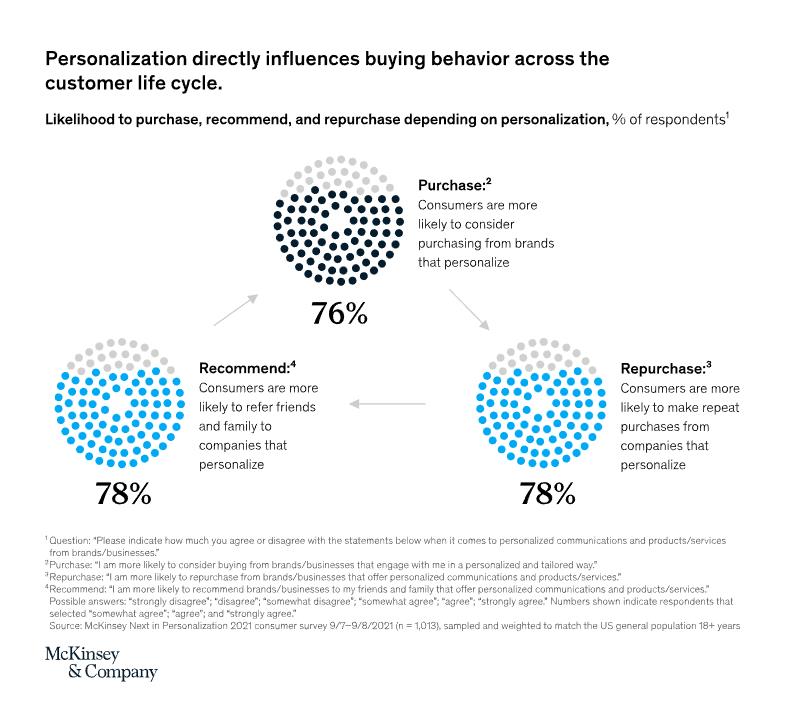
It’s getting harder to remember a time when the internet didn’t dominate the business landscape. In retail, entertainment, and many other industries, ecommerce and digital services have long surpassed their high-street counterparts.
So, how exactly has ecommerce changed the way we do business? And, in turn, how has that changed the way we market? First, let’s look at how ecommerce affected the balance of the economy. Then we can start to understand why marketing has had to adapt to new digital techniques.
What is eCommerce and How Has it Impacted the Economy?
Since the early 2000s, the ecommerce market size has been growing rapidly. It only keeps accelerating, too. According to Insider Intelligence, US ecommerce sales are predicted to pass $1 trillion in 2022. Worldwide, they expect to see $5 trillion in ecommerce sales.

Image sourced from McKinsey
As more businesses had success selling their goods and services online, others naturally followed. We have also seen a change in consumer attitudes as the convenience of online purchases proved popular.
The fact that the global market size of ecommerce continues to grow reflects these changes. At the same time, advancements in logistics, distribution, and business technology continue to develop to support new ecommerce demands.
Moving Retail Online
When we think of ecommerce, the first thing that comes to mind is online retail. Consumer giants like Amazon have made online shopping fast, safe, and convenient. But small businesses have also found greater success by moving to ecommerce models.
That’s in part due to the greater reach of online channels. Social media and other sources have offered an inexpensive way for SMEs to reach a much wider audience.
The Rise of On-Demand Entertainment
Growth in mobile device use has grown alongside ecommerce and digital services. Instant access to entertainment on the go is something that modern consumers have come to expect.
This has led to the success of online subscription services in TV, gaming, and other entertainment. It also developed social marketing through sponsored, promoted, or monetized content on social video apps like TikTok or YouTube.
Small Business Opportunities
E-commerce gives small businesses a chance to compete with the marketing reach of much larger businesses. Through smart social media campaigns, SEO optimization, and other digital marketing techniques, small businesses can cut through the noise in competitive markets.
Ecommerce Types
There are four distinct types of ecommerce businesses. Each has its own style of marketing.

Image sourced from Digital Skill Blog
B2B
Businesses that sell directly to other businesses. These include SaaS companies like these providers of small business VoIP in Canada.
B2C
Businesses sell directly to the customer. This could include online retailers or subscription services like Netflix.
C2C
Customers selling to other customers. This includes the second-hand goods market and resellers operating through auction sites like eBay.
C2B
Customers selling to businesses. This one sounds counter-intuitive, but what we’re talking about here is contract service provision. This can include freelancers, product testers, and so on.
What is the Impact of eCommerce on Marketing?
Marketing is nothing if not adaptive. As ecommerce has emerged and evolved, marketing has gone through many changes. Starting from simple banner ads and email campaigns, digital marketing has come to mean so much more.
The Decline of Traditional Marketing
As digital e-commerce marketing has grown, traditional marketing methods have fallen out of favor. They haven’t gone away entirely, though, and some businesses still make good use of TV, direct mail, SMS & sales calls, and even the good old billboard.
New Marketing Channels
The decline in traditional methods was driven mainly by the growth of new online channels. These offer much higher reach at a relatively low cost. Social media sites, in particular, have allowed marketers to interact with their audience in new, more direct ways.
Customer Data & Efficient Targetting
The most significant advancement in marketing from the rise of online culture is the use of customer data. This part of digital marketing is still advancing as new technologies like data analytics drive marketing insights.
Of course, customer feedback existed before the digital age. Yet, traditional marketing surveys had limited reach, and they could only tell you the customer’s direct opinion. Digital data is not only more accessible, but it also demonstrates customer behaviors.
In analyzing these behaviors, marketers have found the greatest advantages in demographic targeting and customer engagement.

Free to use image sourced from Unsplash
10 Advantages of Ecommerce in Marketing
Why did ecommerce manage to overtake traditional retail and other markets? Well, there are some distinct advantages that ecommerce provides.
- Availability of data
- Omnichannel marketing
- Less physical restrictions
- 24/7 sales & support availability
- Global reach
- Digitization of products & media
- Social & influencer marketing
- AI and advanced BI (Business Intelligence) technology
- Marketing on the go
- Marketing automation
Whether it’s customer data at your fingertips, a global audience, or the ability to advertise straight to a customer’s mobile, ecommerce extends the reach of a business. That extends the reach of your marketing efforts, too. As your reach expands, your ability to target specific users or user groups increases as well.
E-commerce Areas & Their Digital Marketing Techniques
Digital marketing and ecommerce are related, but they’re not the same. It’s more accurate to say that digital marketing evolved alongside ecommerce. Any business can use digital marketing, even if they only have a minimal online presence.
Website-Based eCommerce Marketing
Services like Shopify UAE have made it simple for even small businesses to establish an ecommerce presence. These and larger online retailers tend towards SEO optimization as their main driver of traffic.
SEO optimization is the process of making your site more visible in search engine rankings. It’s a cost-effective way to get your services in front of customers who are making either general or specific searches in your business area.
On-site marketing is still a popular digital marketing tactic. It works on two levels as well. You can source inbound traffic to your website’s landing page through ads and backlinks on other websites and provide the same service to others to generate additional revenue.
E-commerce businesses that are focused primarily on their website will also make on-site optimization a priority. Slow-loading websites are a major reason for high bounce rates in ecommerce. Your bounce rate increases by 32% as your page load time increases from 1 second to 3 seconds. That means it’s vital your marketing is backed up by good site performance.
Mobile eCommerce & Mobile Marketing
Mobile apps and mobile browsing are other areas where digital marketing has had to adapt. Standalone mobile apps have led to the growth of personalized marketing via push notifications and in-app advertising.
Personalization is based on analyzing a user’s habits and tailoring ads and offers to their preferences. This is a powerful tool for increasing ecommerce sales. Studies have found that up to 76% of customers are more likely to purchase from brands that personalize.

Image sourced from McKinsey
More customers, especially in younger demographics, now choose to browse on mobile devices. That means that web-based e-commerce management has had to react to the shift as well. Mobile optimization is now as important to ecommerce software and sites as their desktop performance.
Digital marketing for these sites can also take advantage of the benefits that come with personalization. On-site ads and offers, email campaigns, and more can be personalized by leveraging your customer data.
Social Media Marketing
Social media marketing is now used across all consumer-facing industries. Many B2B businesses maintain client links in part through social media networks like LinkedIn, too. There’s more to social media marketing than setting up a brand account and posting ads, though.
Social listening (or social monitoring) is a popular way for marketers to gauge how their business is perceived. This indirect form of collecting customer feedback can lead to insights into your brand awareness and drivers of satisfaction (or dissatisfaction) in customers.
Influencer marketing, where brands work with online personalities, is also part of social media marketing. In most cases, brands target influencers with a highly relevant audience demographic or those with a wide reach (i.e., large follower counts).
Social media has proven popular as a channel for customer communication, too. Many customers now prefer to reach out to brands with queries over channels like Twitter and Facebook.
Customers expect quick responses, usually within 24 hours, when they reach out on social media. This means social media managers have become an important asset both for customer service and digital marketing purposes.

Free to use image sourced from Pixabay
Email Campaigns & Digital Marketing for Physical Businesses
Some businesses will never be able to do without a physical location. Even if this is you, you can still benefit from the advancements in digital marketing that have come with ecommerce.
As we mentioned above, more traditional digital avenues like email marketing can benefit from personalization. Digital services have also integrated older methods of communication that remain popular, like VoIP with SMS functions.
Final Thoughts: eCommerce Has Changed Marketing For Good
Ecommerce and the rise of technology in everyday life have changed marketing forever. That doesn’t mean that marketing’s role has diminished, though. If anything, marketing, and especially digital marketing, are more relevant than ever.

The post How Ecommerce Transformed Marketing appeared first on DigitalMarketer.
Frequently Asked Questions
What motivations are there for entrepreneurs?
There are three major types of motivation that entrepreneurs can use. Each type has its unique set of strengths as well as weaknesses.
Motivation that is not internal, such as the desire to earn more money, is the most common type. This motivation often stems from financial concerns.
Motivation is externally driven by personal ambition, desire, and interest. This type motivation is more goal-oriented.
Internal motivation is far more rare. Internal motivation is far more rare than wealth. Individuals with it do not seek to be wealthy. Instead, these individuals pursue other goals, like self-development, fulfillment and service.
People who have internal motivation are often called "passionate" as they find fulfillment in their work.
The last type of motivation that is most common is intrinsic motivation. Individuals who find enjoyment and satisfaction in working towards a specific goal are called intrinsic motivation.
The intrinsic motivation of a person is more powerful than the external or internal motivation.
It comes from the inside. It is based in the belief that each person has certain talents or abilities. These talents and abilities enable them to achieve feats that no other person could ever do.
Realizing our talents and capabilities makes us happy and fulfilled. It feels like we are doing meaningful work.
We are happy when we have intrinsic motivation. Knowing that we can achieve anything we set our minds too is what makes us happy.
This sense of accomplishment is what keeps us going when things get tough.
In fact, if you don't enjoy what you're doing, then why bother doing it at all?
Click here to find out more about entrepreneurial motivation.
Why is motivation important to an entrepreneur?
When we feel lost or stuck in life, motivation is the fuel that propels us forward. Motivation gives us the courage to face our fears, and makes decisions that may seem impossible or risky.
Motivation is key to success. When we lack motivation, we become lazy, unmotivated, unproductive, and ultimately unsuccessful.
Motivation is the key to unlocking potential. This means finding a way to stay motivated throughout the day.
Think of it as a muscle. The harder you exercise it the stronger it gets. If it's not exercised, it will begin to weaken.
Some of the most successful entrepreneurs are self-motivated. They set goals and plan the steps to reach them.
Sometimes, however, you might need some help to stay motivated. Here are three simple steps to help you keep going.
Step 1) Get inspired. Look for someone who inspires you. Someone who is already achieving what you'd like to accomplish.
Step 2. Establish small goals. Make sure that each goal is reachable. Focus on the next step rather than the ultimate result. Breaking down big goals into smaller steps will help you reach them quicker.
Step 3. Reward yourself. When you achieve your goals, reward yourself. Reward doesn't necessarily have to be tangible; it could be simply taking the time to do something enjoyable.
Motivation is a choice. Choose to be happy, to be successful, to live a fulfilled life.
If you're ready to transform your life, get started today. It is important to take the first step and decide to change. Then take action. Start living your dreams right now.
How can entrepreneurs motivate their employees to do well?
Motivation can come from any source. It doesn't matter from where motivation comes, as long as it inspires people to take action. Motivation is important for every business, regardless of whether it's a stick or carrot approach.
A motivated employee is more likely to be productive and happy. For a team that performs well, provide them with the tools they need to feel empowered.
You must create an environment that makes them feel valued. It should be a place they can learn and grow. Where they can contribute ideas without fear of punishment.
You create a culture that allows employees to thrive and achieve their goals. That's how you keep your most talented employees happy, satisfied, and productive.
To maintain the culture, you need to reward those behaviors that help you succeed. This could include giving bonuses for reaching goals, offering training opportunities and providing perks, such as health insurance.
It is important to communicate clearly and provide direction. Everyone should know what's expected of him and why.
Make sure your policies and procedures are written down and communicated. It is important that you designate someone to ensure that your policies and procedures are being followed.
Communicate frequently, but most importantly. Make sure your team is informed about the latest happenings in the company. Inform your team about what's going on and what's coming up.
Communication is essential, and taking care of your team will ensure that you remain ahead of the rest. They will take good care of you.
If you don't build a strong relationship with your employees, it could be costly. Research shows that employees who are engaged with their work have higher productivity and profitability than those who struggle for top performers.
It's important to understand that not every employee wants to work at the same pace as others. Some prefer working independently, while others like to collaborate. There are many motivational methods that can be used to motivate people. It's up you to choose the one that works best for you.
Some people may be more responsive to rewards than others, and some might prefer recognition. Whatever works for you, ensure it aligns with the company's goals.
The leader is ultimately responsible for setting the tone. Open-mindedness is key. Listen to your team. Keep in mind that if something is to be done right, it has to be done yourself.
What are the benefits of having an entrepreneurial mindset?
There are many benefits to being an entrepreneur. First, you can become independent. You no longer rely on others.
You will be able to work for yourself and follow your dreams. It helps you make connections with other entrepreneurs who share similar interests and challenges.
You gain confidence. You learn new things as an entrepreneur. This gives you the ability and flexibility to change quickly. This will allow you to think outside of the box and not get stuck in a rut.
All entrepreneurs are free to start their own businesses. We no longer have to follow the rules and regulations set out by society. We are free to choose what we do and how we live.
You can choose to either follow the crowd or be against it. You can choose to succeed or fail. We can choose to fail or win.
The freedom you have is exhilarating. This freedom comes with a lot of responsibility. You are responsible for everything that happens in your business once you take on this role.
To succeed, you have to learn to manage risks. Don't be afraid trying new things. Your goal will be achieved if you are open to learning from your mistakes.
These are some of the lessons you should keep in mind when embarking on your journey.
Remember:
- Entrepreneurship is a lifestyle choice.
- If you own your own business, then you're the boss.
- Be careful of following fashion trends.
- Success isn't measured in money but rather in freedom.
- Balance your personal and professional life.
- Set clear expectations.
- Be honest with your team.
- Do something about it if you want things to happen.
What are the five most important motivators for entrepreneurs?
Motivation is key to success. It is the key to success. We wouldn't exist without it.
Motivational psychology studies how people behave when they are motivated. When we are motivated, we can achieve amazing feats. There are limits to our motivation.
These are the five main motivating factors
- Autonomy - The freedom to choose
- Mastery - The ability to master skills
- Purpose - the sense of purpose
- A feeling of belonging through the concept of relatedness
- Reciprocity: The desire to give something back
These motivators could be useful for your business. You may feel that each of these motivators could be applied to your business. However, each offers a slightly unique perspective on why people act the same way.
An individual might want autonomy because he is able to make his own decisions. Or perhaps he seeks mastery because he wants to become more skilled at his job.
And so on. These are just a few of the possible motivations. There are many more. What are the most appropriate for your particular situation? This is entirely up to you.
To help you find out, I suggest writing three words that describe your ideal environment at work. Then take those same words and apply them to your current working conditions.
If you're having difficulty coming up with ideas then ask yourself, "Why do I do this?" The answer will help you identify your goals.
Once you understand what you want, then you can figure out where your current position is. This knowledge will help you decide if you should make any changes.
You don't have to change anything. It's time you evaluated your options.
You need to think about motivating yourself if you want to improve your life.
Which of the motivators listed above will prove to be most effective for you? It's hard to say. Instead of focusing only on one factor, consider all five.
This will help you achieve your ultimate goal: becoming a successful entrepreneur.
What is your greatest motivation?
What is my favorite motivation in life? Well, let me tell you. My best motivation in life is to help people feel better about themselves. To make people realize they are incredible, because they really are. They are worthy love, for they are.
They are entitled to happiness.
I am here to remind everyone that it is more important to feel good about yourself. Nothing. I'm willing to do whatever it takes for our world to be better.
We feel better about ourselves and are more compassionate towards others when we feel that way. You can stop judging other people based upon superficiality, and instead see the person inside. That's really cool.
The most powerful way to motivate someone is to show them that they already have everything they need within themselves.
While they might not realize it yet, this is why they have been struggling with something for so many years. They knew deep down that they could heal themselves.
All they required was the right environment, the correct support system, and a positive mindset. They somehow forgot that.
It's not hard to see why they lost it. Because they were too busy trying figure out what the problem was. Trying desperately to fix it, without realizing that they actually had all the tools they needed to solve it.
They forgot to realize that they didn't know the solution.
It is possible to create a completely new reality. All you have do is tap into your inner genius.
The rest will fall into place once you do. You'll be amazed by how easy it is to manifest your dreams.
You see, every person has their unique superpower.
It is up to us to master its use.
Statistics
- According to analysts, Johnson has high appeal in all four quadrants tracked at the multiplex: male, female, over-25 and under-25. (forbes.com)
- "If you improve by just 1% every single day, in several months, you will have improved by 100%. (carolroth.com)
- "Most of the time when people ask me about motivation, 80 percent of the time, I attribute it to gratitude. (entrepreneur.com)
- That means for $150,000, you could have bought 10 percent of Airbnb." (entrepreneur.com)
- “Effective communication is 20% what you know and 80% how you feel about what you know. (americanexpress.com)
External Links
oberlo.com
twitter.com
cnbc.com
- This inspiring quote Jeff Bezos keeps in his fridge
- Billionaire Richard Branson: These are my top 10 tips for success
businessinsider.com
- 101 Best Inspirational Quotes For Entrepreneurs
- Why Elon Musk sets nearly impossible goals for SpaceX employees
How To
How do you keep your motivation up when starting a business.
If you want to make money online you need to focus on building an income stream. This means that you need to find a way of generating consistent revenue from your website.
This is easiest if you create products that solve customer problems. But how do you go about creating these products? Here is the real adventure.
There are two ways to approach product creation. The traditional approach is to have a great idea, then spend hours perfecting that idea.
However, there is another option. There's another way. Simply ask yourself: "What problem do I want to solve?" Find the right product to solve that problem.
This is called the "finding-a solution" method. You are likely to uncover a problem at another site using the find-aproblem approach.
Once you have found the problem, it is time to decide if you want or not to solve it. These are the three most important questions to ask:
- Is it worth the effort?
- What can you do to fix it?
- Is it worth it?
If you are able to answer yes or more of the following questions, you have the foundation of a good product. The next step is to determine how to package it.
Businesses that lack a plan for generating regular revenue are most likely to fail. But once you develop your plan, it becomes easier to keep going even after you run out of ideas.
Sometimes you may find yourself with more ideas than time to put them all into practice. You can assign tasks to others in your team or hire freelancers.
You will remain motivated so long as you keep growing your income stream.
Remember, you can achieve any goal if you're willing and able to put in the hard work. So why wait? Get started today!






